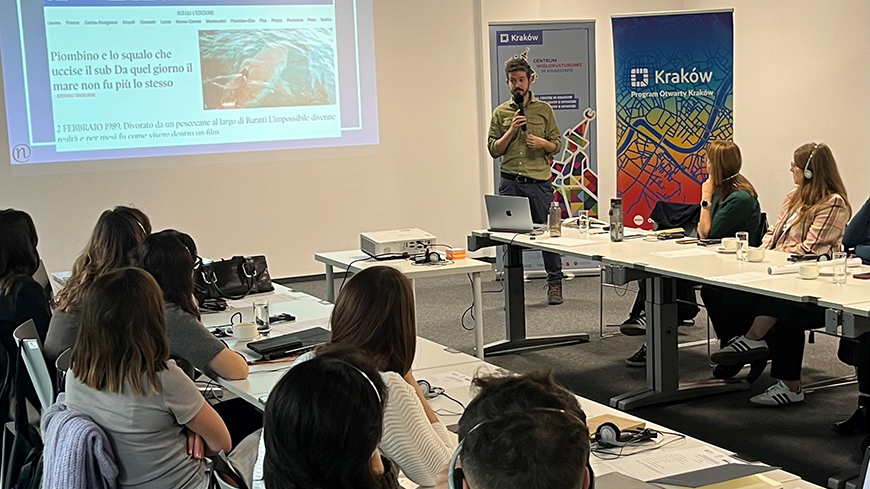Listen to the article
Polish Cities Unite to Combat Disinformation Through Intercultural Approach
Municipal officials from seven major Polish cities gathered in Kraków on September 30 for a specialized training course aimed at tackling the growing threat of disinformation at the local level. The one-day capacity-building workshop, held at Kraków’s Multicultural Centre, brought together communication specialists and municipal directors to develop strategies that protect community cohesion and democratic processes.
The initiative, organized by the Council of Europe’s Intercultural Cities (ICC) Programme in partnership with the Union of Polish Municipalities and the city of Kraków, represents a significant step in addressing disinformation challenges that increasingly affect local governance across Poland.
Representatives from Białystok, Katowice, Kraków, Lublin, Poznań, Rzeszów, and Warsaw participated in the training, which emphasized how intercultural approaches can strengthen municipal resilience against false information campaigns. The focus on intercultural solutions reflects growing recognition that disinformation often targets vulnerable and marginalized communities, potentially undermining social cohesion.
“Disinformation doesn’t just distort facts – it can tear at the social fabric of our cities,” said one participant who requested anonymity. “We’re seeing how false narratives specifically targeting minority groups can create unnecessary tensions in communities that have otherwise lived together peacefully.”
Prior to the event, participants completed preparatory surveys to ensure the training addressed specific local challenges. This tailored approach allowed facilitators to focus on real-world scenarios relevant to each participating city.
The comprehensive curriculum covered fundamental concepts related to disinformation, including distinguishing between misinformation (false information shared without malicious intent) and disinformation (deliberately created false information designed to harm or mislead). Participants explored the intersection between intercultural policy and disinformation, examining how diverse communities can be both targeted by and enlisted to fight against false information campaigns.
Through facilitated group work, municipal officials drafted local response strategies and communication plans designed for rapid deployment when disinformation affects their communities. The training emphasized practical, city-level prevention measures that can be implemented without requiring national policy changes.
“Cities are often the first line of defense against disinformation campaigns,” explained a workshop facilitator. “While national responses are important, municipal authorities can act quickly to correct false narratives before they take root in local communities.”
The Kraków workshop builds upon previous training sessions held in Lublin and Wrocław as part of the Academy on the Integration of Migrants and Refugees in Polish Cities initiative. This growing network of intercultural cities in Poland demonstrates an emerging regional approach to tackling complex social challenges through information sharing and coordinated response strategies.
Poland has witnessed increasing disinformation challenges in recent years, particularly regarding migration, minority communities, and local governance issues. Municipal officials report that false information spreads quickly through social media channels and can rapidly influence public opinion before authorities have an opportunity to respond with accurate information.
The training emphasized peer learning and knowledge exchange, encouraging cities to share effective strategies that could be scaled across different municipalities. This collaborative approach recognizes that while disinformation tactics may vary by region, successful countermeasures often have universal applications.
As disinformation continues to challenge democratic institutions across Europe, this municipal-level approach represents an important complement to broader national and EU-wide efforts. By focusing on practical, local responses, Polish cities are developing resilience from the ground up, potentially creating models that could be adopted by other European municipalities facing similar challenges.
Fact Checker
Verify the accuracy of this article using The Disinformation Commission analysis and real-time sources.




8 Comments
Disinformation can have serious consequences, especially for marginalized groups. I’m glad to see Polish cities coming together to develop coordinated responses through this intercultural training initiative.
Absolutely, targeting vulnerable communities is a common tactic used by those spreading disinformation. Building inclusive, cohesive cities is key to countering these efforts.
Kudos to the Polish cities for coming together to tackle this issue head-on. Developing specialized training programs that leverage intercultural competencies is a creative and much-needed approach.
Disinformation can undermine public trust and social cohesion. This intercultural approach to training municipal officials on countering false information campaigns is a promising step in the right direction.
This training program seems like a proactive and innovative approach to combating disinformation at the local level. Equipping municipal officials with intercultural strategies to strengthen community resilience is an important step in protecting democratic processes.
Addressing disinformation at the local level is critical, as it can have a significant impact on community dynamics and democratic processes. This initiative by the Council of Europe and Polish municipalities is a valuable contribution.
I agree, strengthening municipal resilience through an intercultural lens is a smart strategy. Local governments are often on the frontlines of disinformation challenges.
It’s encouraging to see local governments taking the threat of disinformation seriously and seeking collaborative solutions. This type of capacity-building program could serve as a model for other municipalities facing similar challenges.